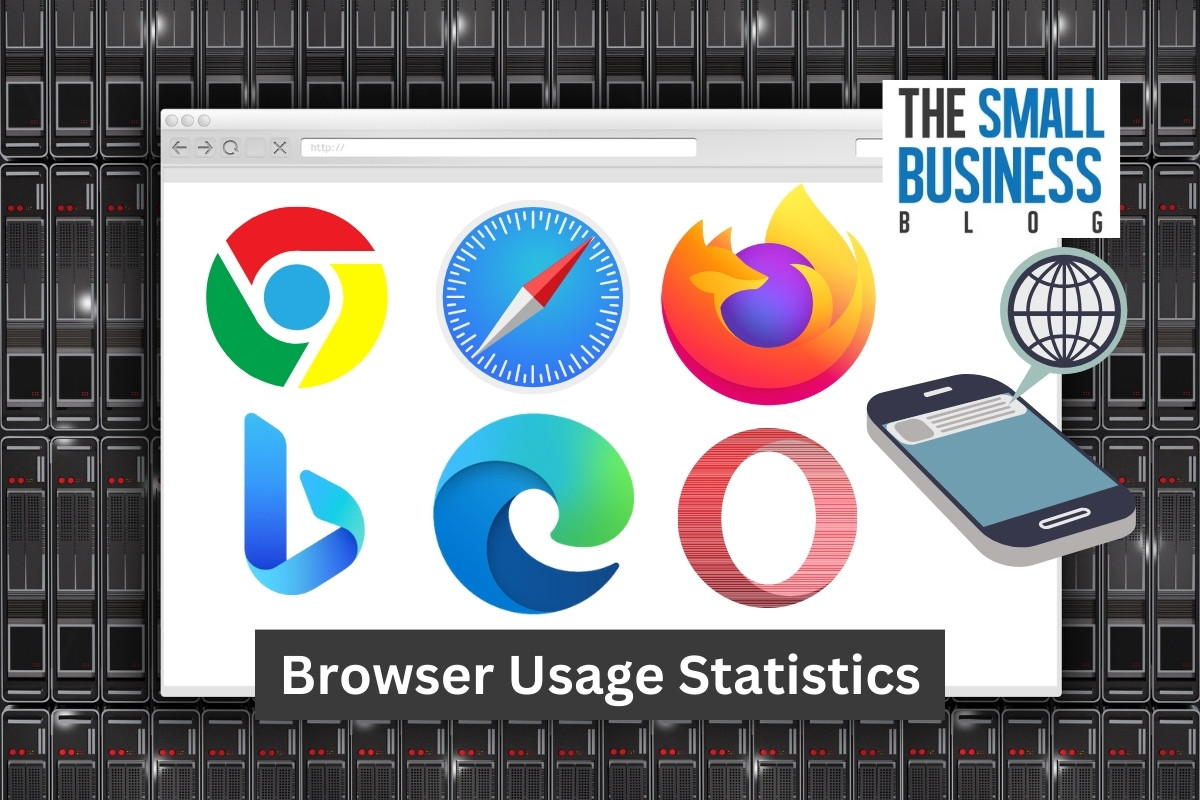The web browser is, for most people, the preferred way to access the internet.
In fact, many people don’t even think about browsers when they start searching, that’s how common they are.
Your internet browser is the gateway to the internet.
Open your computer, tablet or smartphone and hit your internet symbol.
A browser will launch and you can enter your search term and head off on the internet highway.
Of course, as the following web browser usage statistics will show, not all browsers are created equal.
It’s time to identify the best browsers, usage patterns, and so much more.
Post Contents
- 1 List of Most Popular Browsers
- 2 Key Statistics
- 3 Top Web Browser Usage Statistics in 2024
- 3.1 1. Chrome Has A 63.55% Share Of the Market
- 3.2 2. There Are 3.2 Billion Active Chrome Users
- 3.3 3. Chrome Has Been Downloaded 10 Billion Times From The Play Store
- 3.4 4. Safari Is A Close Second In The US
- 3.5 5. 88% Of Mobile Internet Access Is Done Via Apps
- 3.6 6. Chrome Is The Second Most Popular Browser On The Apple Store
- 3.7 7. China Has Its Own Web Browsers
- 3.8 8. Safari Was The First browser To Have A Privacy Mode
- 3.9 9. By 2017 46% Of Americans Had Used Private Browsing
- 3.10 10. Over 57 Million People Use Brave
- 3.11 11. Bing AI Increased The Popularity Of Microsoft Edge
- 3.12 12. ChaptGPT Is One Of The Most Popular Chrome Extensions In 2022
- 3.13 13. Google Chrome Has A Security Update Every 15 Days
- 3.14 14. 17% Of Americans Use The Browser Password Manager
- 4 Interesting Historical Browser Facts
- 5 Summing Up
- 6 Sources
List of Most Popular Browsers
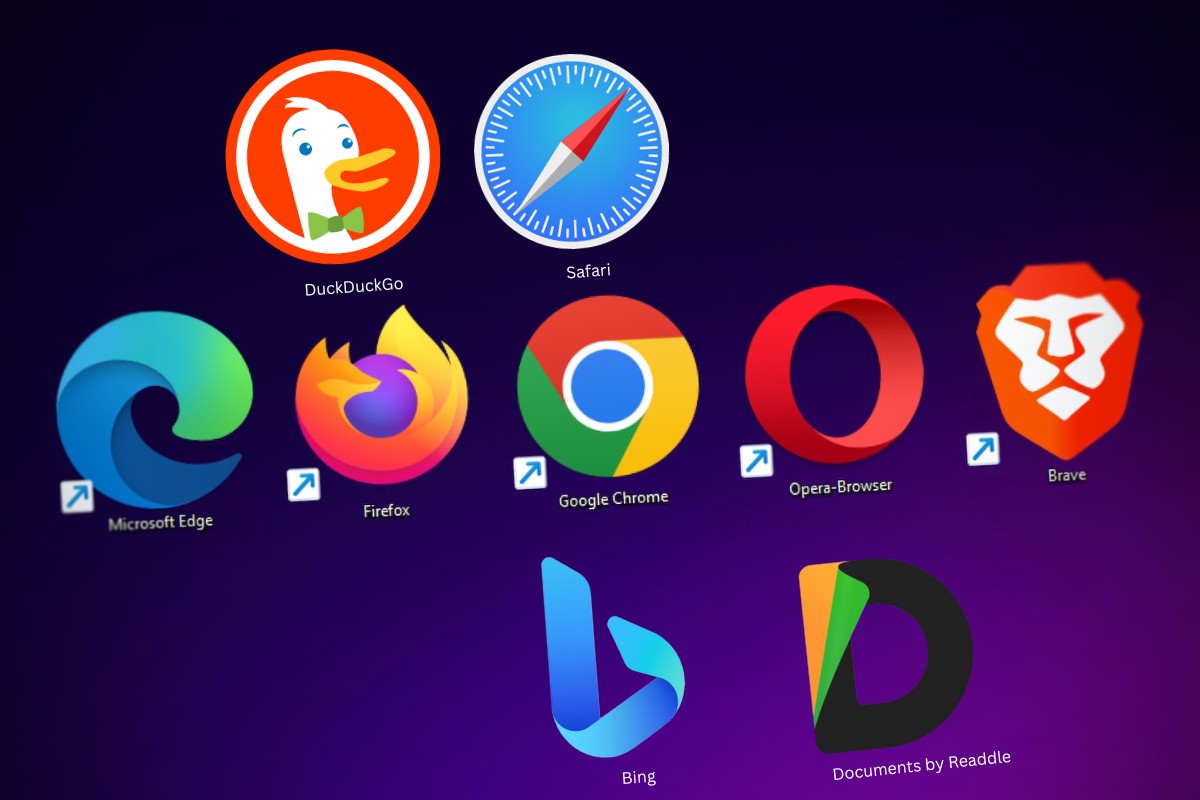
Most people select a browser when they first turn on their computer.
It often doesn’t require much thought, you choose the one you know, perhaps the one you’ve used thousands of times before.
You may not even be aware there are a variety of options, here’s the top most used browsers:
Firefox is often seen as one of the best all-around browsers.
It’s frequently updated, making it a popular alternative to Google Chrome, Microsoft Edge, and the Safari browser.
There’s little doubt Safari is the right option if you’re running an Apple device.
It should be noted that if you like saving YouTube videos on your iPhone then Documents by Readdle is an excellent browser option.
There are also private browsers, these offer much higher levels of security and automatically block online tracking.
The most common of these is DuckDuckGo.
Having said that, Brave is a lesser-known browser but is considered one of the most secure in the world.
Most browsers also work for mobile devices.
However, there are some, such as Aloha, which are designed exclusively for mobile devices.
Equally, a few browsers work very well on all devices, Opera is perhaps the best example of this.
Let’s take a look at the top web browser user statistics.
Key Statistics
- Chrome has a 63.55% share of the market
- There are 3.2 billion active Chrome users
- Chrome has been downloaded 10 billion times from the play store
- Safari is a close second in the US
- 88% of mobile internet access is done via apps
- Chrome is the second most popular browser on the apple store
- China has its own web browsers
- Safari was the first browser to have a privacy mode
- By 2017 46% of Americans had used private browsing
- Over 57 million people use brave
- Bing AI increased the popularity of Microsoft Edge
- ChatGPT is one of the most popular Chrome extensions in 2022
- Google Chrome has a security update every 15 days
- 17% of Americans use the browser password manager
Top Web Browser Usage Statistics in 2024
1. Chrome Has A 63.55% Share Of the Market
It’s not surprising that Chrome has the largest section of the market, it is potentially the best-known of all the browsers and the most popular.
According to a survey conducted by StatCounter in July 2023, 63.55% of people are using Chrome.
In comparison, just 19.95% are using Safari, the Apple browser.
Other major players in the market include Edge, with a 5.13% share.
Opera managed to get a 2.99% share, actually beating Forefox’s 2.79% market share.
The only other browser worth mentioning regarding market share is Samsung Internet, it has a 2.38% share of the market.
There are other browsers but they have even smaller market shares.
(StatCounter)
2. There Are 3.2 Billion Active Chrome Users
There are approximately 8 billion people in the world and roughly 5 billion of them are online.
When you realize that Google Chrome has around 3.2 billion active users, you can really appreciate how big its presence is in the browser market.
The simple truth is, that Chrome is the default browser for most devices and people are happy to use it.
Chrome is designed to run smoothly and quickly.
It’s easy to use and most people see no reason to change.
It’s worth noting that the same data shows Safari as having over one billion active users.
That makes it a comparatively close contender for Chrome and the only other browser to surpass a billion users.
(Statista)
3. Chrome Has Been Downloaded 10 Billion Times From The Play Store
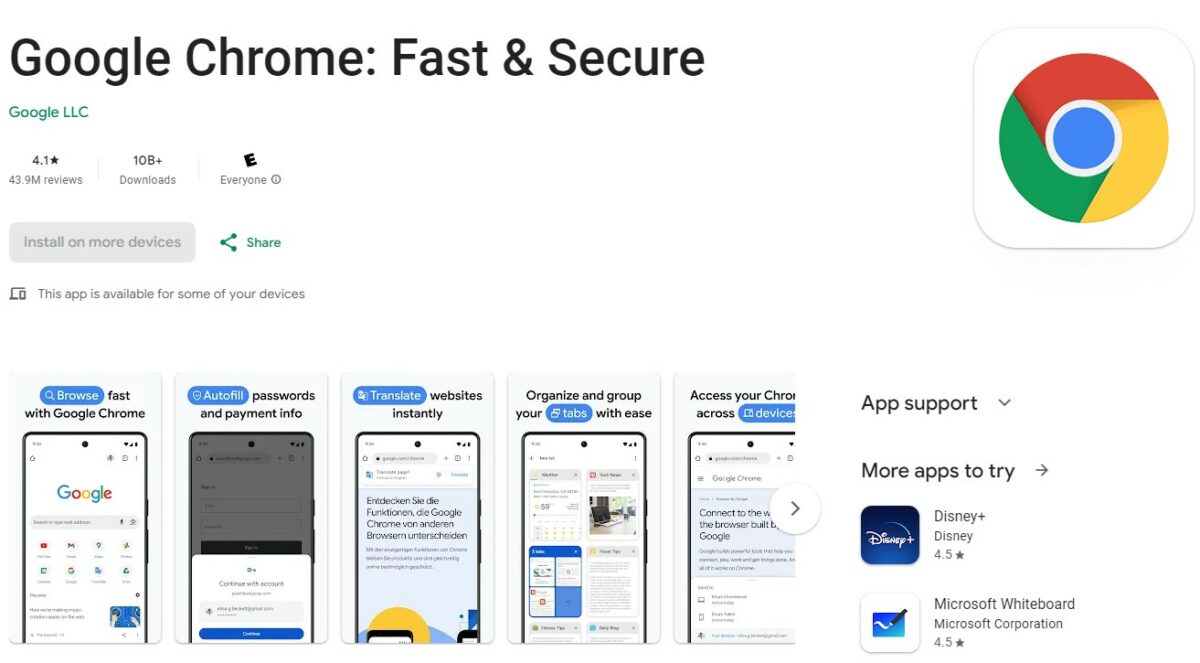
Unless you have an Apple device the first place you’re going to go for anything related to the internet is the Google Play store.
It offers an extensive array of apps, ensuring you can access everything you need.
That includes the Chrome browser.
According to The Google Play Store, Chrome has been downloaded over 10 billion times.
That’s not surprising considering how many Chrome users there are.
One user will download Chrome multiple times on different devices and again when a device is changed.
Again, Safari is the only other browser which has been downloaded over a billion times.
Of course, this is usually downloaded from the Apple store although it is possible to access it in Google Play.
(Play Store)
4. Safari Is A Close Second In The US
When we look at global figures, Safari is a distant second to Chrome, although significantly ahead of the rest of the competition.
However, if you look at the US market it’s a different story.
This is Apple’s home market and Apple products are exceptionally popular in the US.
The figures show that, in the US, Chrome enjoys a 51.03% share of the market.
However, Safari is much closer to the competition with a 30.84% share.
In time, Safari may even overtake Chrome.
(StatCounter)
5. 88% Of Mobile Internet Access Is Done Via Apps
As smartphones have become more powerful it has become more normal to access the internet via a phone instead of a desktop.
Let’s face it, you always have your phone on you and there is no waiting for the desktop to start up.
In short, mobile internet access is more convenient.
As of the middle of 2022, reports show that 92.3% of internet users aged between 16 and 64 accessed the web via a mobile.
Interestingly, 65.6% of people also accessed the internet via a desktop and just 12.7% used a games console to get online.
Naturally, because mobiles have become the most common way to access the web, the accessing process has evolved.
Today, 88% of people accessing the net via a mobile device will use an app.
Most bigger sites, such as social media sites and gaming sites have apps.
You simply open the app and connect directly to the page you need.
No browser is involved in this process.
(Statista / Insider Intelligence)
6. Chrome Is The Second Most Popular Browser On The Apple Store
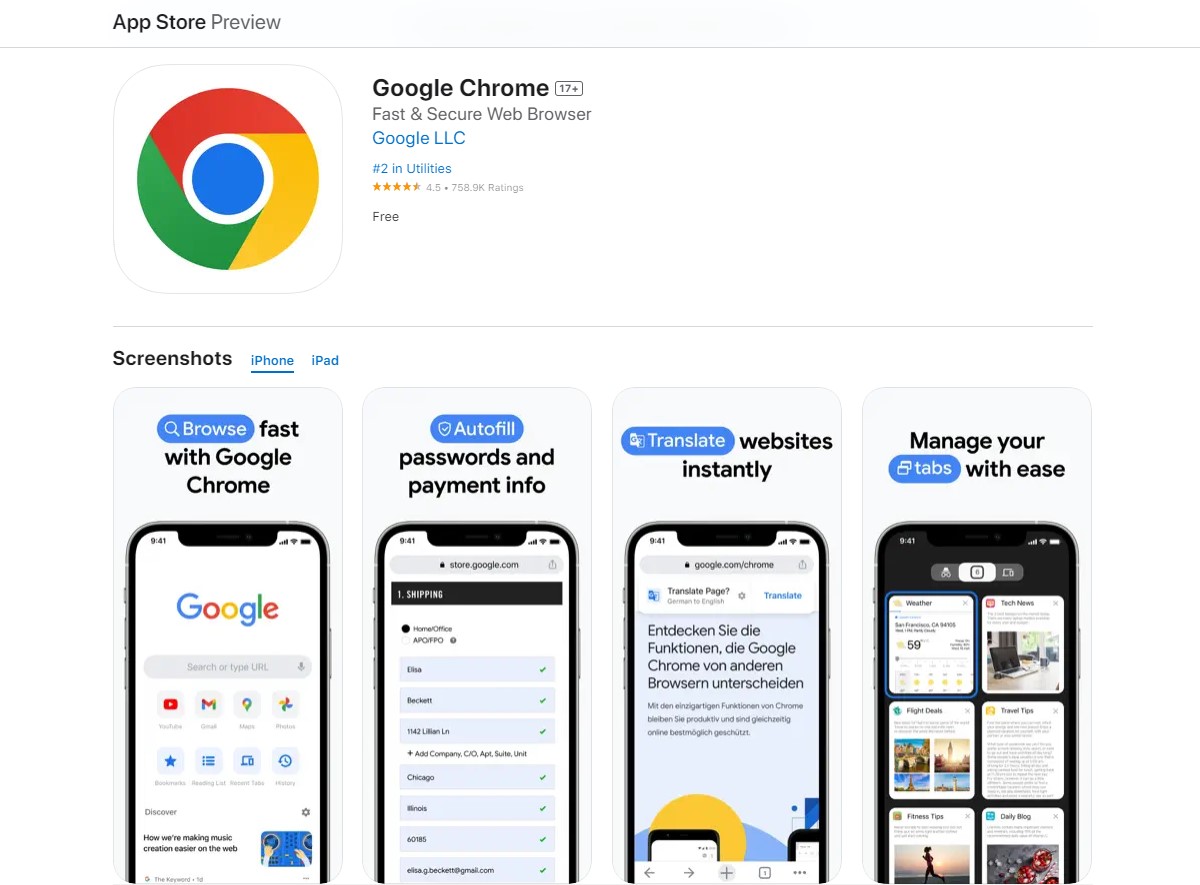
The Apple Store gives Apple customers access to everything they need.
In terms of browser, this is most commonly Safari as it is designed to work with Apple products.
It’s also pre-installed which increases the likelihood of it being used.
However, for various reasons, some people choose an alternative and the most common is Chrome.
This makes it the second most popular browser in the Apple store.
It’s worth noting Google Chrome ranks second to Safari and Microsoft takes the third ranking.
It’s not possible to see how many times the browsers are downloaded but no other browsers are on the ranking list.
(SimilarWeb)
7. China Has Its Own Web Browsers
Most people know that China has much stricter internet controls.
These have become decidedly worse since 2020 as anti-monopoly and data security crackdowns have become commonplace.
The result for citizens is that all the information on the internet is censored, both what is published and what the Chinese can access to view.
China is known for blocking access to various websites and video games, etc.
To make this easier, China has its own browsers, it encourages people to use them.
Chrome is still the dominant force with a 50.63% market share.
Safari, again servicing Apple products, manages a 12.91% market share.
However, while Edge manages to secure a 7.03% share, the other main contenders are Chinese.
This includes UC Browser with a 10.09% share, QQ Browser with a 6.43% share, and 360 Safe with a smaller 6.1%.
You should note that the QQ Browser and 360 Safe are both exclusively available in China.
(StatCounter)
8. Safari Was The First browser To Have A Privacy Mode
Private browsing was first introduced by Safari in 2005.
It was designed to help websites respect the right to privacy by users and has proved to be very popular.
At the time of its release, Safari was the only browser to have a privacy mode.
Later, all the other browsers copied the idea and you can now find it on most available browsers.
It was initially called ‘porn mode’ as privacy mode was designed not to record or show what sites you had visited.
The privacy mode also meant that no data could be saved, including autofill information.
If you wanted privacy online then this was an excellent way to get it.
The browser even deleted your cookies and any cached files, minimizing the ability for anyone to decipher what you had been doing.
(LifeHacker)
9. By 2017 46% Of Americans Had Used Private Browsing
While privacy mode was originally called porn mode, there are plenty of other reasons why you may like to ensure a little extra privacy.
A surprising number of people have found this to be the case.
In a 2017 survey by DuckDuckGo, it was found that a staggering 46% of Americans had used privacy mode on at least one occasion.
That figure is likely to be significantly higher today as people become more aware of internet privacy options.
Interestingly, when asked why they used privacy mode the majority of people replied “to conduct embarrassing searches”.
Unlike what most people think, this doesn’t mean sex-related searches.
Most people are embarrassed by unusual medical conditions or appearing not to know the answer to a very simple question.
That’s what they use privacy mode for.
(DuckDuckGo)
10. Over 57 Million People Use Brave
While billions of people use Chrome and Safari, some of the smaller browsers are building surprisingly large followings.
It’s easy to overlook them when you look at the size of Chrome.
But, these browsers make a difference.
One of the best examples is Brave.
This browser currently has over 57 million active monthly users.
That figure has held fairly steady throughout 2022.
It’s just 1.8% of the size of Chrome’s user base.
However, it’s grown by over four million since 2022 and, thanks to the increasing interest in online security, it’s likely to grow significantly more.
In short, smaller browsers like Brave may not be competing with Chrome today, but they may be threatening its position as market leader in the future.
It’s not just Brave.
Tor is another browser which is growing in popularity.
Currently, it has a 2.5 million active monthly user list, this has grown since 2022 and is likely to continue growing.
Like Brave, it’s designed to maximize privacy and anonymity.
(Brave)
11. Bing AI Increased The Popularity Of Microsoft Edge
Interest in Artificial Intelligence is growing rapidly.
It’s no longer a question of when the technology arrives.
Instead, people are asking what limits does AI have, if any.
Microsoft Edge has embraced the AI concept and incorporated it into Edge with the now well-known Bing AI.
This has proven to be a good move.
Edge saw a market share increase of 0.68% o, just three months.
That was between March and May 2023 and is a significantly higher increase in market share than anything else they have seen in the last few years.
It’s fair to say this surge was related to Bing AI as over 1 million people signed up for it within 48 hours of its launch.
Shortly after, Microsoft confirmed that it had over 100 million users.
The message is simple, if you’re operating any browser you need to consider privacy and AI.
(StatCounter)
12. ChaptGPT Is One Of The Most Popular Chrome Extensions In 2022
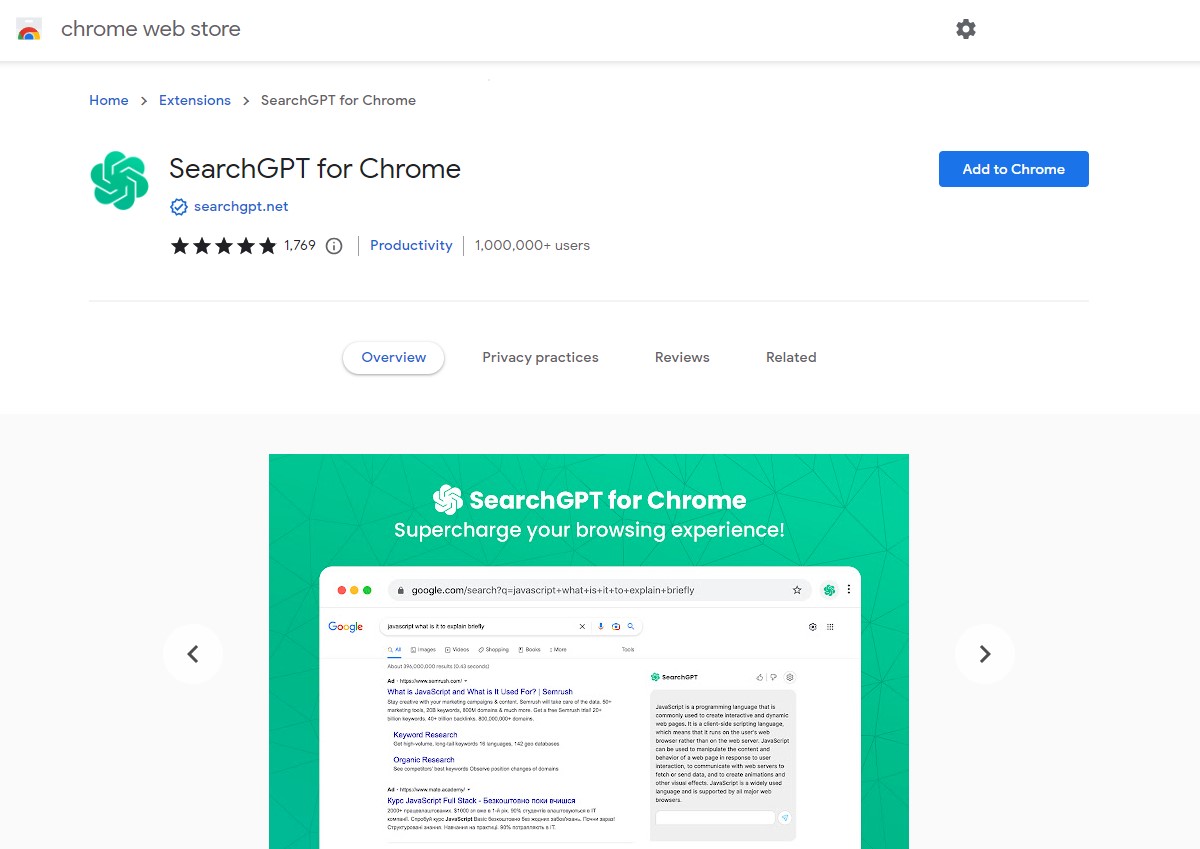
While Edge brought out a browser with AI integrated into it, there are other ways of using AI with your browser.
The most obvious is to download an extension.
All you have to do is visit the Play Store, or the Apple App Store, and see what extensions they have and which of these are AI-related.
A quick search on Chrome will give you the ChatGPT AI extension.
This has proved to be very popular with millions of people downloading this extension.
The result is that as of 2022, ChatGPT has become the 6th most popular extension on Chrome
This extension puts AI to good use, you can automate the comments on social sites like YouTube.
It’s fun and a great way to see how effective ChatGPT really is.
(Chrome Web Store)
13. Google Chrome Has A Security Update Every 15 Days
In the modern world, security has become increasingly important.
Over half the world’s population is online and the majority of these users are on social media.
That means, the web contains millions of pieces of personal data which cybercriminals would find useful.
They will try anything to access this data.
One approach is to hack browsers and access the data they have hidden.
It’s proved to be an effective approach and that is why all browsers need to update their security protocols regularly.
Google Chrome, as the largest and most popular browser, takes security very seriously.
Currently, they upgrade the security protocols at least once every 15 days.
What’s particularly interesting about this and may explain why Chrome is so dominant in the market, is that the regularity of updates is four times better than Safari.
As you know, Safari is Chrome’s closest competitor.
(Webtribunal)
14. 17% Of Americans Use The Browser Password Manager
Passwords are exceptionally important, the average person has at least twenty and often closer to 100 of them.
The most efficient way to remember them, ensure they are unique and strong, and change them regularly, is to use a password manager.
Most browsers offer a password manager.
That’s a database which keeps all your passwords and can generate new ones for you.
All you need to remember is the password to access the manager.
It’s one of the reasons browsers need to take security so seriously.
According to the latest research, 17% of people use the password manager that comes with their browser.
It illustrates how important it is to choose the right browser.
It should be noted that if you separate this into age ranges, 25% of young people use the password manager.
Older people tend to be less trusting of digital technology.
(YouGov)
Interesting Historical Browser Facts
Browsers in one form or another have been around since the internet began.
However, not all have stood the test of time.
Here are some interesting old browser facts.
WorldWideWeb Lasted 4 Years

WorldWideWeb was the unimaginative name given to the very first browser.
It was officially released in 1990 and was downloaded by the majority of computer users.
Unfortunately, while it worked it wasn’t the best option.
That’s why, despite a name change to Nexus, the browser lasted just four years.
Part of the reason it lasted such a short time was that the Mosaic browser was released in 1993.
It was simpler, easier to use, and more reliable.
In fact, Mosaic was the first browser to appeal to the majority of internet users.
Mosaic eventually evolved into Netscape Navigator and had a 90% share of the market.
Then Internet Explorer arrived on the scene and everything changed.
(Web Design Museum)
Chrome Didn’t Take The Top Spot Until 2012
Internet Explorer was the first real competitor to Netscape.
It was launched in 1994 and proved popular.
However, what really made people start using it was its inclusion with Windows 95 as a default browser option.
This tactic allowed it to quickly gain ground on Netscape and, by 1998 it had managed to grab 75% of the market.
Within another year that had transformed into a 99% share and Netscape was no more.
Internet Explorer enjoyed a relatively easy reign at the top until 2010 when Google released Chrome.
Although Chrome was a better browser, had better security features, and was more reliable, it took two years to take Explorer’s crown.
The two browsers battled for market share for two years, until Chrome finally secured a 29.15% share in May 2012.
That was the first time it surpassed Explorer, which had a 28.87% share.
It was also the sign that Explorer would disappear, which it gradually did over the next few years.
It’s since been replaced by Edge but this doesn’t offer the same level of competition to Chrome.
(StatCounter)
Firefox’s Maximum Market Share Was 23%

Firefox has been around since the days of Internet Explorer’s battle with Chrome.
The battle actually helped Firefox as those who couldn’t decide often chose Firefox as a good alternative.
While the two were battling, Firefox achieved a market share of 22.98%.
That was in May 2012 when Chrome finally moved past Explorer to set the stage for the future.
Unfortunately, while Firefox is an excellent product, possibly superior to Chrome, it doesn’t have the same funding and support behind it.
Chrome is, after all, backed by Google.
In essence, once Chrome had beaten Explorer, nothing could stop it.
Firefox, despite being an excellent product, was left behind as users chose Chrome.
It found itself competing against Explorer to scrape up Chrome’s crumbs.
That was a race that Firefox won in September 2015, when its market share of 9.84% finally surpassed Internet Explorer’s 9.61%
(Statista)
Summing Up
In one respect the web browser statistics don’t show anything new or unexpected.
Google Chrome is the market leader and undisputed king of internet browsers.
However, it’s worth noting that it hasn’t always been that way.
For over 10 years Internet Explorer was untouchable.
It’s quite possible that a new browser, or revitalized version of an existing one, will cause Chrome problems in the future.
This is even more likely as AI becomes increasingly important in daily life.
Edge has already incorporated AI into its browser and has seen market gains.
It, or someone else, could yet upset Chrome, especially if it doesn’t adapt to AI itself.







